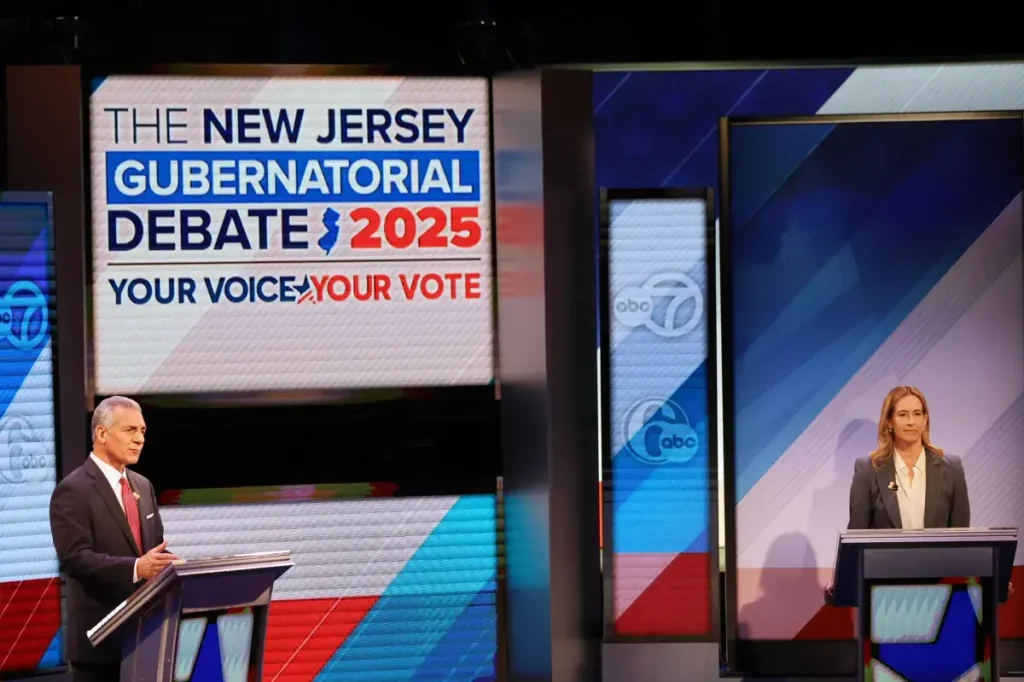Sherrill and Ciattarelli Face Off in Final New Jersey Gubernatorial Debate
In a contentious final debate before New Jersey’s November 4 gubernatorial election, Democratic Representative Mikie Sherrill and Republican former Assemblyman Jack Ciattarelli traded sharp personal attacks that revealed the high stakes of this closely watched race. The debate, which touched on issues from the opioid crisis to the Trump administration, highlighted the increasingly partisan divide in a state that, while traditionally Democratic, has seen Republicans gain ground in recent years. With New Jersey being one of only two states holding gubernatorial elections this year (alongside Virginia), political analysts are viewing the outcome as a potential indicator of national political trends heading into the 2026 midterms.
The debate took an especially heated turn when Sherrill launched an accusation against Ciattarelli’s former medical publishing business, claiming he “made his millions by working with some of the worst offenders and saying that opioids were safe” and had “killed tens of thousands of people by printing misinformation.” This reference to Ciattarelli’s company, which reportedly published material from pharmaceutical companies about chronic pain treatments before he sold it in 2017, drew an immediate “shame on you” from the Republican candidate, who firmly denied the characterization. Ciattarelli countered by labeling her comments “a lie” and shifted blame for the current fentanyl crisis to former President Biden’s border policies, demonstrating how national political narratives continue to shape state-level campaigns.
The personal attacks escalated when Ciattarelli referenced a controversy surrounding Sherrill’s military past, making a pointed remark that at least “I got to walk at my college graduation.” This barb referred to Sherrill’s inability to participate in her 1994 U.S. Naval Academy graduation ceremony amid a cheating scandal – though Sherrill has maintained she was penalized for refusing to turn in classmates. The Democrat has also raised concerns about how her unredacted military records were allegedly released to a Republican operative with connections to Ciattarelli’s campaign, adding another layer of controversy to an already tense race. These exchanges reveal how both candidates are willing to leverage personal history as political ammunition in what has become an increasingly bitter contest.
Donald Trump’s presidency cast a long shadow over the debate, with both candidates staking out clear positions on the current administration. When asked to grade Trump’s performance, Ciattarelli confidently awarded an “A,” while Sherrill countered with an “F.” The Democratic candidate repeatedly attempted to tie her opponent to Trump’s policies and persona, suggesting Ciattarelli is beholden to the president. The Republican candidate pushed back by emphasizing his independence, stating: “Let me be clear. No matter who sits in the White House, my job is to stand up for the 9.3 million citizens of the state, and I will.” However, he also acknowledged the practical value of maintaining a good relationship with the federal executive, adding: “In times of need, it’s best to have a relationship with whoever occupies the White House.” This exchange underscores how national politics continues to influence state-level elections, with candidates carefully calibrating their proximity to polarizing national figures.
Both candidates expressed concern about the federal government shutdown’s potential impact on New Jersey, particularly regarding the Gateway tunnel project connecting New Jersey to New York. The Trump administration recently paused approximately $18 billion in funding for the tunnel and a subway line extension while reviewing compliance with new diversity policies – a decision that has significant implications for the region’s infrastructure and economy. Sherrill criticized her opponent’s reluctance to challenge Trump on this issue, noting: “Jack won’t say one cross word about the president, even when he froze Gateway tunnel funding.” Ciattarelli, seemingly frustrated by Sherrill’s repeated references to Trump, responded: “I don’t know what he has to do with our property taxes. I don’t know what he has to do with our energy rate.” This exchange highlights the tension between addressing immediate local concerns and navigating the complex relationship between state governance and federal policy.
The November 4 election comes at a pivotal moment in New Jersey’s political landscape. Republicans haven’t won a gubernatorial race in the state since 2013, and New Jersey voters have consistently supported Democratic presidential candidates since 1988. However, GOP candidates have been making inroads, with Trump increasing his vote share in the state by 10 points in 2024 – the best showing by a Republican presidential nominee in two decades. A Republican victory in this gubernatorial race would likely send shockwaves through Democratic circles and be interpreted as a warning sign ahead of the 2026 midterm elections. As the campaign enters its final days, voters have options for casting their ballots, including in-person early voting from October 25 to November 2 or by mail, ensuring accessibility in this consequential state election that may have national implications.


